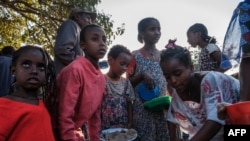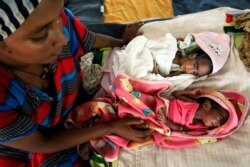The U.N. children’s fund warns the conflict in Ethiopia’s northern Tigray province is stripping tens of thousands of children of their rights, plunging them into a protection crisis that is causing them unimaginable long-lasting harm.
UNICEF spokesman James Elder has just returned from a visit to Ethiopia’s Tigray. He says his agency’s fears for the welfare of children expressed at the onset of the conflict nearly six months ago now are being realized.
Elder said children are suffering from a protection crisis as the incidence of rape and gender-based violence grows. Since the start of the year, he said just one UNICEF supported center has been reporting an average of three cases of gender-based violence every day. Those are the reported cases, he says, adding the true number is certainly higher.
“The personal stories I received from children who had been raped or testimonies of women who were victims of sexual violence were harrowing and quite cruel…Yes, I heard dramatic stories of children as young as 14. I heard reports of gang rapes, quite, quite bewildering,” he said.
Elder said authorities must publicly denounce the attacks and hold the perpetrators accountable. He said UNICEF is providing medical and psychosocial support to the survivors of sexual assault.
He said children caught in the conflict also are suffering from education and nutritional emergencies. He said 1.4 million children have not been in school for more than a year. Of the many children he encountered on his visit to Tigray, Elder said the story of 16-year-old Merhawit remains seared in his mind.
“She had walked 300 kilometers with her baby brother on her back from the west of the country. I mean pretty intense fighting. That was 300 kilometers and in broken flip flops. Those stories abound. She was a star in physics and now she is searching for food and has not seen a classroom in a year," he said.
Last November, fighters from the Tigray People’s Liberation Front (TPLF) attacked army bases in the region, according to the federal government. The attack, Ethiopia’s prime minister said, prompted his government to launch a military offensive to push the group out.
The conflict has interrupted harvesting activities, resulting in lost income and livelihoods. And now, because of the fighting, farmers cannot access their land to plant their crop, resulting in severe food shortages.
Elder said that is causing a spike in malnutrition, with an increasing number of acutely malnourished children requiring life-saving treatment.
He said UNICEF requires greater international support to meet the many protection, education and nutritional needs of Tigray’s children and women. He notes less than half of UNICEF’s $47.6 million appeal for Tigray is funded.





